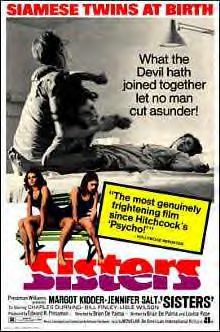 A 1973 effort by Brian DePalma that adequately showcases both his good and bad qualities as a filmmaker. It’s highly derivative and overwrought, in other words, but also visually dazzling and often downright ingenious.
A 1973 effort by Brian DePalma that adequately showcases both his good and bad qualities as a filmmaker. It’s highly derivative and overwrought, in other words, but also visually dazzling and often downright ingenious.
SISTERS was Brian DePalma’s seventh feature and his first success, being a stylish Alfred Hitchcock-inspired chiller that thematically informed much of De Palma’s subsequent filmography (notably OBSESSION, DRESSED TO KILL, BLOW OUT, BODY DOUBLE and RAISING CAIN).
The film’s stars Margot Kidder (who’s never been better in a movie) and Jennifer Salt were roommates at the time, and close friends of DePalma, while co-star William Finley was a college pal of the director who starred in quite a few of his films, including DePalma’s very first feature MURDER A LA MOD in 1968.
Danielle Breton, an attractive young model, meets a dashing young man on a game show. The aggressive Danielle lures the man back to her apartment where the two have a tryst. But the following morning the guy is stabbed to death, apparently by Danielle’s deranged twin sister Dominique. The killing is witnessed by Grace Collier, a muckraking reporter, from her apartment window.
Grace alerts the police and Danielle’s apartment is investigated. Nothing is found and Grace is reprimanded by the cops, who are already upset with her for exposing incidents of police brutality. Grace continues investigating the murder on her own, together with a private detective. The two conclude—correctly—that the murdered man’s body was hidden in a fold-up couch, which they spy loaded into a truck. The P.D. follows the truck, determined to track the couch to its ultimate destination.
Grace for her part delves into Danielle’s past, and discovers that the latter is one of two conjoined twins separated as teenagers. The other twin, Dominique, has apparently dedicated herself to evil…the only problem is that Dominique has been dead for some time!
It all comes to a head in a secluded sanitarium where Danielle is being treated by her depraved handler/husband. Grace turns up to investigate and winds up captured and drugged, in which state Grace hallucinates that she’s Danielle’s twin!
In many respects SISTERS is a dry run for Brian DePalma’s DRESSED TO KILL (1980), which closely replicates its overall structure. That structure, of course, is borrowed from Alfred Hitchcock’s PSYCHO, with its early insinuation that we’ll be following the fortunes of a character who is shockingly killed off in the opening 20 minutes. Other Hitchcock films referenced in SISTERS include REAR WINDOW (in the overall emphasis on voyeurism) and SPELLBOUND (in the themes of psychological domination).
Yet DePalma was particularly inspired here, and adds a wealth of bizarre and imaginative touches. The voyeuristic game show of the opening scene begins the film on a psychologically unsettling note entirely appropriate to the subject matter, while the red and white color scheme of the protagonist’s apartment building is arrestingly weird (and recalls the décor of Ingmar Bergman’s CRIES AND WHISPERS, released in the U.S. the same year as SISTERS).
The film is largely free of the gimmicky visuals of DePalma’s later efforts, yet does contain one highly recognizable DePalma trademark: an early split screen sequence simultaneously depicting the murder that sets the narrative in motion and Grace witnessing it from her apartment window. It’s one of the finest-ever uses of a split-screen, at once a startling cinematic innovation and an example of narrative ingenuity that (unlike so many of DePalma’s other tricks) doesn’t feel gratuitous or show-offy.
Then there’s the climax, wherein the proceedings go from a slick and stylish thriller to something altogether stranger and more distinct. The story’s PSYCHO-esque twist isn’t at all difficult to foresee, and DePalma seems aware of this in the way he reveals said twist long before the climax, delivering an irresistible hallucinatory joyride in place of the standard horrific reveal.
Vital Statistics
SISTERS
American International Pictures
Director: Brian De Palma
Producer: Edward R. Pressman
Screenplay: Brian De Palma, Louisa Rose
Cinematography: Gregory Sandor
Editing: Paul Hirsch
Cast: Margot Kidder, Jennifer Salt, Charles Durning, Bill Finley, Lisle Wilson, Barnard Hughes, Mary Davenport, Dolph Sweet, Justine Johnston, Olympia Dukakis
